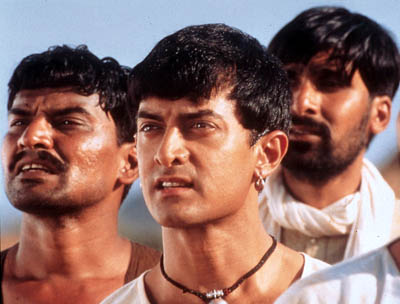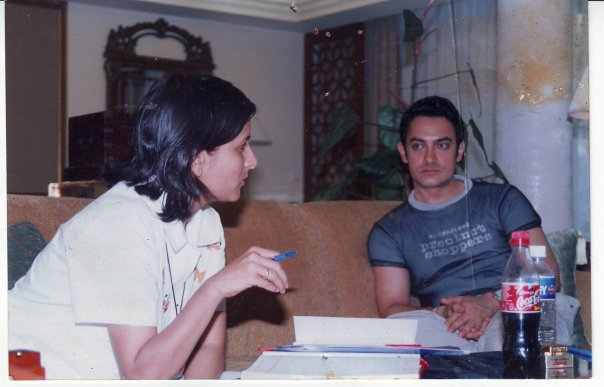So Aamir Khan has turned 46. In a youth obsessed country, a man on the top of his game still and going as far as to play a 20 something IIT student convincingly in a film, is interesting to watch.
I interviewed Aamir Khan in the wake of Lagaan‘s Oscar resonant success many years ago. He was cozily ensconced in one of Leela Kempinsky’s many voluminous suites in Bangalore. The subtly imposing presence of a security professional (Actor Ronit Roy was handling Khan’s security then) in the anteroom where I waited with a photographer for the actor to finish prior engagements, established in not so many words that we were dealing with a star of no ordinary stature. Many scribes I was told later (by someone managing the interviews), had embarrassed themselves and the actor by being excessively star-struck.
For a star who lives with a degree of fame unimaginable to many of us, Aamir was surprisingly sane. He did not perform to an invisible audience like most actors do. He did not hold court. Did not make grandiloquent gestures or self-congratulatory statements and most surprisingly, he listened! That is a miraculous feat for most actors to achieve. You can tell just how grounded and real a celebrity is by the degree of attention they pay to you when you ask them a question. Most of the time, they talk and talk and talk and you have to frame your questions around their monologues. My first question to him was,”Do you feel vindicated?”
This was after he had done the Oscar beat and had come back to India. And he had laughed amusedly and countered, “Should I be?” It was surreal to see a man I know only as a larger-than-life, celluloid projection, leaning forward and listening with intent concentration and then answering like he really meant it. There was no posturing and no, “I am a star and I set the rules.”
I came away impressed. Within minutes of meeting him, it is clear that Aamir Khan is not a random success story. He has a master plan and he is not abrasive about it but he knows, where he is going and how. His personal life may not always pan out according to plan but his professional life is like a perfectly turned car engine, well-oiled and sputter free. My first celluloid memory of him is as an incidental presence in Ketan Mehta’s Holi. Trivia has it that he had shaved his head during that period because his heart had been broken.
Yes, he was that visibly passionate and reactive then. Now ofcourse, that passion has been leashed and sharpened to a needle-point precision and is directed towards movies he wants to redefine himself in by losing weight, bulking up, playing characters he can detail to the last twitch of a brow. He directs, produces and orchestrates publicity campaigns, seldom missing a beat. And even though he has not forgiven erratic award juries and does not attend popular award functions still, the media is now not his enemy but a fawning confidante.
But we must start at the beginning. The time when he did Aditya Bhattacharya’s brooding Raakh. Aamir played an obsessive young man who sets out to avenge the rape of the woman he loves and spirals into frightful psychological darkness. He played the role with clenched fierceness and a great deal of internalised intensity, his taut body language and burning gaze saying things the dialogue did not. But it was not a portent of the things to come. Mansoor Khan’s Qayamat Se Qayamat Tak, a feudal take on Romeo and Juliet reinvented him as a sunlit youth icon and suddenly he was vulnerable, heart-breaking, the stuff of every teenager’s dream. Yet occasionally, you caught a glimpse of just how dark he could be when he hovered over a crouching Madhuri Dixit in Dil, threatening her with unmentionable things.
That is why it is surprising that he turned down Yash Chopra’s Darr because he would have made us fear the stalker in a way Shahrukh’s lost puppy dog turned occasional psychopath did not Not that it affected Aamir’s big picture because by now, many love stories and a few insignificant films later, he was doing just one film a year and reinventing himself with each one. He had played the hamming chauvinist in Raja Hindustani, a beefed up reference point from On the Waterfront in Ghulam, a wise-cracking tapori in Rangeela, an idealistic cop in Sarfarosh. But even this success paled before the decade defining success of Lagaan, a film he not just acted in but also produced in 2001. Dil Chahta Hai came the same year and the leap from a sweat beaded, rebel peasant to a ridiculously well-groomed, urban drifter began the Aamir Khan legend.
The one he is crafting right now and adding more and more layers and dimensions to. It is interesting though that noone talks about Aamir Khan’s acting talent, his memorable moments in cinema as often as they talk about his perfectionism, his intelligent approach to the different aspects of cinema. Unlike many other cinematic legends, his success is not built on the strength of unforgettable dialogues, a great voice, stunning dancing talent and overwhelming charisma.
Something in Aamir Khan’s mind ticks differently. He knows his limitations as an actor. He has however worked brilliantly with his strengths, bringing into focus the less than obvious stuff that few top actors in Hindi cinema bother themselves with. Physical preparation and internal spadework for a role before the camera switches on. The subtle changes in body language, gait, posture. Watch him sitting on his haunches in Lagaan and his wiry peasant frame and compare him to the sharp suited businessman in Dil Chahta Hai, walking down the streets of Sydney with a brief-case and you know just how hard he works on the nuances of his roles.
His silences as an actor are incomparable. Remember him in Dil Chahta Hai when he gets on a train and it begins to move away, leaving behind the woman he is beginning to fall for? He watches her wistfully, longingly, in sudden awareness of what she means to him as the distance between them expands.
Or when he is eating a farewell dinner with Shalini (Preity Zinta) and her sarcastic fiance who is trying to provoke and belittle him. He eats with a determined calm without looking up and answers the barbs directed towards him with loaded one liners. The only time the composure breaks is when he says, “I would have killed him,” to convey that if he was with this woman, no one would have dared to mess with her. And you believe him. Yes, no one does silences or breaks down and cries better than Aamir Khan.
Be it in QSQT when he comes back home, beaten and heartbroken and sobs in his father’s arms. Or when he can’t bear his loneliness and desolation in a gloriously beautiful room in Dil Chahta Hai and cries the way only grown men can when they lose an irreplaceable part of themselves. Or when he sobs and mourns the death of a friend and the end of innocence in Rang De Basanti.
Because he is so determined and prepared and understands the mechanics of cinema so well, it is hard for him to get along with strong-willed directors like Ram Gopal Varma, Vikram Bhatt, Anusha Rizvi and Amole Gupte. He usually wants more control over a film than directors are willing to accord him and it results in well-documented skirmishes. His eye for detail, his understanding of the way the Indian audience reacts to different cinematic genres, his uncanny marketing genius has today made him a formidable one man industry.
His power does not come just from the money he earns but from the creative clout he has today to design and plug cinema he believes in and from the credibility he has earned as someone who will give more than his 100 per cent to anything he does, be it an ad film or a feature film. No one really discusses the indiscretions of his personal life because today his persona as an actor, director, producer is invincible.
Today, Aamir Khan inspires respect but hysteria is another matter. He is too real to be a fantasy. Too much of a chameleon to become an object of desire. He is not the quintessential romantic or the definitive action hero or a niche comic talent. But he has done it all in measured portions and this works for him because he does not have to do anything today to keep the audience in a state of fevered excitement.
Today he works with what he knows and he knows his audience. And they know him too and also that he is a man who listens to even what they do not say. And more than 25 years since his debut, he has turned the unsaid into the most powerful statement any actor can make.








A beautiful tribute to a formidable artist! Loved reading it …
i agree. nobody does crying better than aamir. but i think he cried best in Akele Hum Akele Tum, the almost-last scene when his son is being taken away after the court orders and Tanvi Azmi comes back to collect the bat he has left behind and sees Aamir, sitting alone, forlorn with the light streaming into the room and bawling.